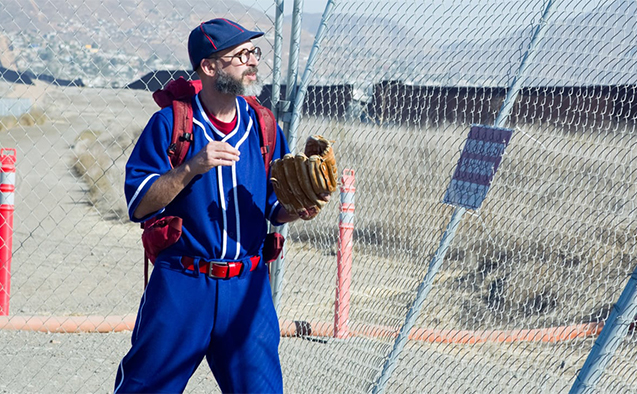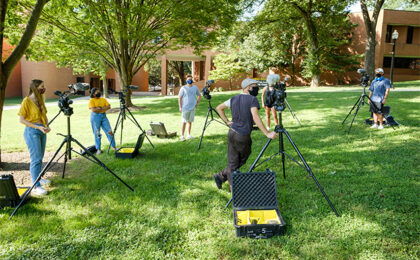“Border-Ball” uses baseball to build connections
WFU professor’s film on his 40-day pilgrimage along the U.S.-Mexico border premiers Oct. 17

It’s been nearly one year since filmmaker and Wake Forest associate professor Joel Tauber undertook “Border-Ball,” a 40-day pilgrimage along the U.S.-Mexico border to build community through baseball.
Wearing a custom vintage baseball uniform and backpack in blue, white, and red, Tauber tossed a baseball as he walked along the border and invited people to walk with him and play catch. He filmed people he met and gathered personal reflections and stories related to the border and immigration.
A virtual exhibition on Tauber’s pilgrimage exploring immigration, compassion and hope will open on Oct. 17 with ArtCenter DTLA in Los Angeles, California, launching the online premiere of the “Border-Ball” documentary.
The film will be available to the public through the ArtCenter’s virtual exhibition page on Oct. 17 and 18. The “Border Ball” trailer is available here. The exhibition page also includes links to a blog where visitors can share their own immigration stories and read those shared by others.
Aperture Cinema in Winston-Salem is screening the 20-minute documentary film through Nov. 5.
 Tauber, who is teaching filmmaking this semester, says we learn from history. “We can learn from our mistakes. Sometimes, we just need a bit of a cultural jolt – which might come from a show or movie to awaken us and help us remember that we are all connected.”
Tauber, who is teaching filmmaking this semester, says we learn from history. “We can learn from our mistakes. Sometimes, we just need a bit of a cultural jolt – which might come from a show or movie to awaken us and help us remember that we are all connected.”
Border-Ball is just one of many examples of how faculty are using the arts to enliven student experiences in classrooms across nearly every academic discipline, says Wake Forest’s Associate Provost for the Arts and dance professor Christina Soriano. “Joel’s documentary will encourage deep and rich conversations from Los Angeles, California, to Winston-Salem, North Carolina,” Soriano says.
Tauber began his pilgrimage at the Otay Mesa Port of Entry in San Diego, California, and walked along the Border Wall before heading north two and a half miles to the Otay Mesa Detention Center. He traveled there and back again daily—a seven-mile journey that connects legal entry to the U.S. with the Border Wall and the Detention Center holding those who might be in the country without legal permits.
“I thought a lot about the Holocaust during my pilgrimage. How my paternal grandparents survived it. How my grandfather’s brother died in a slave labor camp,” says Tauber. “I sensed their pain more acutely, as I was imagining how difficult it must be for all the immigrants and refugees locked up in detention centers. There is a psychological, ethical and spiritual cost to our actions. And they impact all of us, wherever we are. Despite our borders. Despite our boundaries.”
Border-Ball Trailer
Categories: Research & Discovery
Wake Forest News
336.758.5237
media@wfu.edu
Meet the News Team
Headlines
Wake Forest in the News
Wake Forest regularly appears in media outlets around the world.



